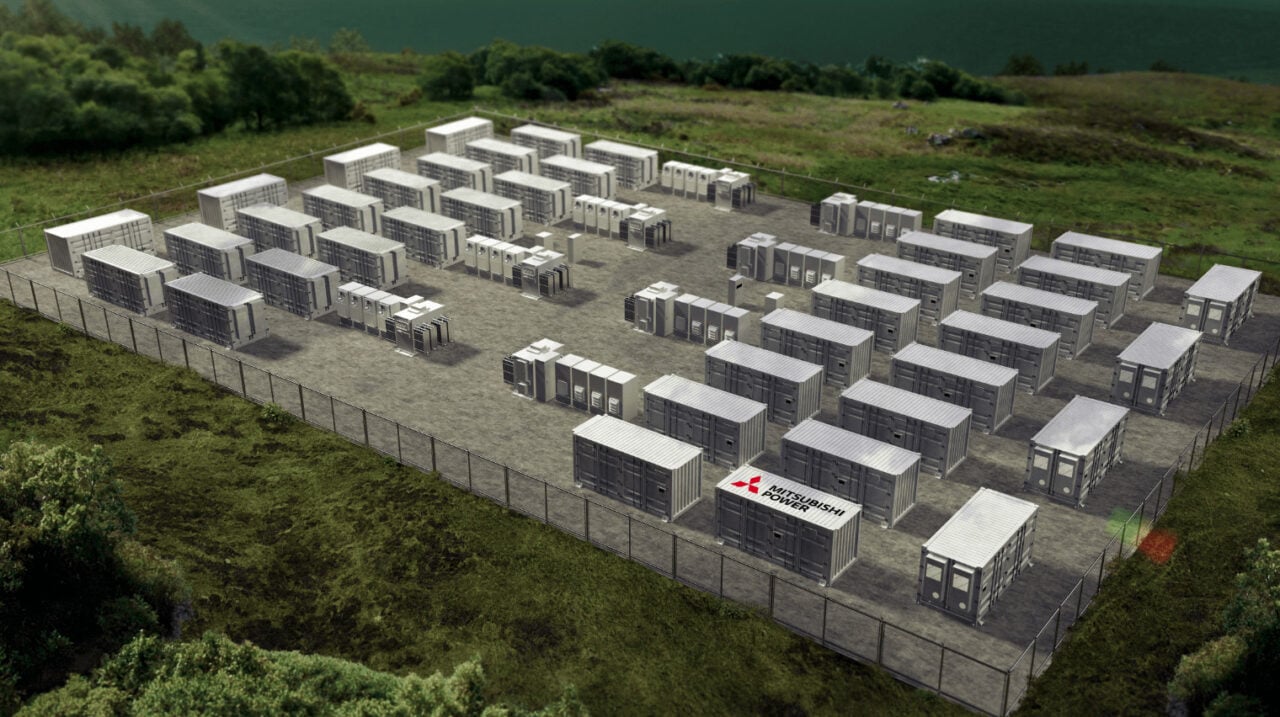
A render of what the BESS projects could look like. Image: Mitsubishi Power.
Mitsubishi Power has announced four battery energy storage system (BESS) projects in the Republic of Ireland, marking its first step into the European energy storage market.
The power solutions arm of the large Japanese conglomerate has entered into an exclusive agreement with developer ION Renewables to provide its Emerald solution for the four battery energy storage system (BESS) projects, which will total 185.5MW/371MWh.
The two-hour projects are set to come online in 2024 and will primarily provide fast frequency response and ancillary services to Ireland’s national grid, operated by Eirgrid, through its Secure Sustainable Electric System (DS3) framework.
They will eventually also incorporate energy arbitrage from renewable power into the range of applications they provide, ION Renewables told Solar Power Portal’s sister site Energy-Storage.news.
All four are at existing brownfield industrial sites where existing grid interconnection points are underutilised, Mitsubishi Power Americas’ senior VP for energy storage solutions Thomas Cornell told Energy-Storage.news.
The Emerald solution can have up to six hours’ duration, and includes project engineering, equipment supply, and a 10-year long-term service agreement. When asked why a two-hour duration was chosen, Cornell said:
“With all of our projects, durations are driven by customer specifications or available interconnects. The current energy market in Ireland favours a one-hour system. ION Renewables and Mitsubishi Power conducted a detailed analysis of the future requirements for the network, and see this extending out to two hours and beyond over the next few years. We have built this into the base case because by the time the systems are operational, we believe two hours will be most suitable to meet the market needs.”
John Ward, director, ION Renewables, said in a press release: “These installations represent a viable and economical solution to balance the network, strongly aligning with the principles of the REPowerEU draft directive. These projects demonstrate that effective solutions for storing energy can be achieved by utilizing renewable power that would otherwise be curtailed.”
Ireland is targeting a renewable energy mix of 70% by 2030 and the BESS projects will help to integrate more renewables on the grid. Frequency response services well-suited to batteries have made Ireland a relatively advanced market for battery energy storage relative to its size.
The island – as both the Republic and Northern Ireland share a grid, they can be categorised as one energy market – is set to have 1,400MW of BESS installed by the end of this year, according to research firm Delta-EE. However, the firm expects annual deployments to fall over the next few years from a high of c.750MW in 2021 to c.250MW from 2025 onwards, partially because of a new interconnection planned with France.
Indeed, a number of BESS projects in Ireland have taken steps forwards recently as the sector expands, including NTR battery storage projects totaling 22MW securing ten-year contracts for the supply of grid capacity to the Irish grid system and RWE’s largest battery storage project to date entering full operations in County Monaghan.
ION Renewables told Energy-Storage.news Eirgrid has extended the current qualification for existing market arrangements under the DS3 programme to 2031, easing the expansion of the battery space after concerns from some in the sector recently about its scheduled expiration in 2023/24.
“Beyond this time (2031), there will be new market arrangement, and it is ION’s view that these new arrangements will not necessarily disadvantage the business case. As Ireland moves towards a higher renewable energy deployment, reducing its dependence on imported fuel, the market for energy storage will only increase,” a spokesperson added.
“This may result in some retrofitting of the current sites to 6-hour duration, but ION is very confident with Mitsubishi Power as its partner that it will be able to response rapidly to whatever requirement the market has at that time.”
While the partnership with ION represents Mitsubishi Power’s first step into the European market, another division of the conglomerate – Toshiba Mitsubishi Electric Industrial Systems Corporation – is part of a business scheme that is currently developing two 49.5MW BESS in Tollgate and Cuxton, near London, England.
This article originally appeared on Energy-Storage.news.

